What To Write For Common App Essay
What should I write about in the Common App Essay
Can you express who you are in 650-words or fewer?
Learn here about how to tackle this incredibly important college essay.

By NOELLE COMPTON
When preparing to apply to college, one of the first tasks is figuring out what to write about in the Common App Essay. The Common App Essay is, some say, among the most important documents that you will ever write. It is the face of your application, and in its brief 650 word limit, you are expected to share your best, most personal self. No pressure, right?
In this guide, you will learn a strategy for determining what to write about in the Common App Essay. This guide will cover five sections:
- Understanding the Common App Essay
- Demonstrating your best qualities
- What to write about
- What NOT to write about
- Demonstrating grit
At the end of this article, you should feel empowered to brainstorm your own story to make the admissions officers say, "yes!"
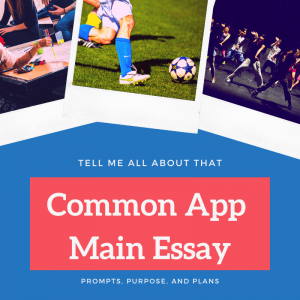
Understanding the Common App Essay
What is the Common App Essay?
The Common App Essay is a 650-word (or fewer) personal statement that comes with the Common App , the streamlined online application that most colleges in America accept. Your main essay is not specific to any particular college, but every college will see it, so it's got to be good.
When the admissions officer reads your main essay, they will want you to answer the question, "Who are you?" This is pretty hard to show someone in 650-words, so applicants will need to have a discerning eye. To help narrow it down, the Common App offers you a choice of seven prompts to guide you in the right direction:
Common App Essay prompts
Here are the seven essay prompts for 2020-2021, courtesy of the Common App .
- Some students have a background, identity, interest, or talent that is so meaningful they believe their application would be incomplete without it. If this sounds like you, then please share your story.
- The lessons we take from obstacles we encounter can be fundamental to later success. Recount a time when you faced a challenge, setback, or failure. How did it affect you, and what did you learn from the experience?
- Reflect on a time when you questioned or challenged a belief or idea. What prompted your thinking? What was the outcome?
- Describe a problem you've solved or a problem you'd like to solve. It can be an intellectual challenge, a research query, an ethical dilemma – anything that is of personal importance, no matter the scale. Explain its significance to you and what steps you took or could be taken to identify a solution.
- Discuss an accomplishment, event, or realization that sparked a period of personal growth and a new understanding of yourself or others.
- Describe a topic, idea, or concept you find so engaging that it makes you lose all track of time. Why does it captivate you? What or who do you turn to when you want to learn more?
- Share an essay on any topic of your choice. It can be one you've already written, one that responds to a different prompt, or one of your own design.
Which Common App prompt is the best?
To the admissions officer, it truly doesn't matter which prompt you choose to answer. Their only goal is to understand you better, and it is likely they won't even look to see which prompt you chose to answer before they start reading. The best strategy that you can employ when choosing a prompt is to think of the story that you want to tell, then see which prompt best fits the story.
As far as popularity goes, here is the run-down for the 2018-2019 application season: :
- 24.1% of students used: "Share an essay on any topic of your choice. It can be one you've already written, one that responds to a different prompt, or one of your own design."
- 23.7% of students used: "Discuss an accomplishment, event, or realization that sparked a period of personal growth and a new understanding of yourself or others."
- 21.1% of students used: "The lessons we take from obstacles we encounter can be fundamental to later success. Recount a time when you faced a challenge, setback, or failure. How did it affect you, and what did you learn from the experience?"
- 31.1% of students used the remaining four prompts.
So if you want to be unique, you could try to go for one of the lesser-used prompts. But given that nearly a quarter of all students eschewed the offered prompts entirely, it's difficult to say whether that could make a difference.
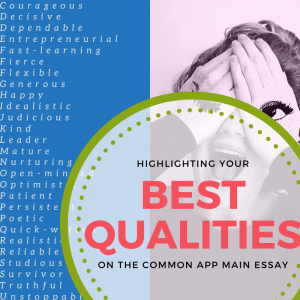
Demonstrating your best qualities
As mentioned already, the Common App Essay strives to answer, in 650 words or fewer, who are you? This is tough since you might not even know the answer to that question yourself. So when thinking of a story that you want to tell in your essay, it can help to tackle a smaller question first: what do I want to demonstrate to the admissions officers about myself?
To be clear, you are not going to start your essay by saying, "I am an (insert adjective) person." Rather, you are going to use your story to demonstrate a good quality about yourself that shows the admissions officer who you are rather than tells them. This might seem like a cliche writing tip but trust us. It's what they want.
What is a defining characteristic?
A defining characteristic is something notable about you, something that makes you special. To start, check out the list of 100 characteristics below and try to think of two or three words that you think describe you well:
| Accommodating | Easy-going | Industrious | Persistent |
| Adventurous | Efficient | Intuitive | Poetic |
| Altruistic | Encouraging | Joyful | Practical |
| Ambitious | Entrepreneurial | Just | Progressive |
| Analytical | Experienced | Kind-hearted | Realistic |
| Artistic | Far-sighted | Leader | Reliable |
| Authentic | Flexible | Loving | Resilient |
| Balanced | Forthright | Loyal | Resourceful |
| Candid | Funny | Mature | Self-reliant |
| Careful | Generous | Moral | Sincere |
| Caring | Gentle | Motivating | Systematic |
| Communicative | Good | Natural | Thoughtful |
| Compassionate | Graceful | Nurturing | Trustful |
| Competent | Happy | Objective | Understanding |
| Cooperative | Helpful | Optimistic | Unselfish |
| Courageous | Holistic | Original | Versatile |
| Creative | Honest | Outgoing | Vibrant |
| Cultural | Idealistic | Passionate | Well-wishing |
| Decisive | Imaginative | Patient | Wholesome |
| Diplomatic | Independent | Perceptive | Youthful |
As you can see, this list is far from complete, and many of the words would require substantial explanation, or even additional characteristics, to make sense. For example, if you want the admissions officer to know that you are easy-going, you are going to have to make the case that this is a good thing. Similarly, if you want the admissions officer to know that you're altruistic, you'll need to make the case that you're authentic, as well.
How do we use our defining characteristic?
You will be using your characteristics to inspire a story about a time in which you proved yourself to be the embodiment of your characteristics. In order to start doing this, try making a list like this one:
My characteristic is resourceful .
Times when I was resourceful : The time I got a flat tire on the way to basketball practice and instead of calling my mom, I Youtubed how to change a tire myself. Or, the time that my little sister was having trouble memorizing the order of the planets, so I wrote a rap song to help her learn.
My characteristic is flexible .
Times when I was flexible : The time that my chemistry group chose to pursue a different research topic after I'd already done my work, but since I knew the topic was better, I agreed to make the change. Or, the time that my coworker's child was sick and I had to cover her shift, even though I was exhausted.
You use the defining characteristic to provide the kernel of inspiration for the story you will tell. It will also give your story direction and give you a feeling that you can continually circle back to.
A word of caution
While it can be tempting to choose a characteristic that is controversial, counterintuitive, or shocking, I would advise against this. For example, if you want to demonstrate that you are lazy in order to tell a story about a time everything turned out perfectly in spite of your minimal effort, this gives your admissions officer the impression that you might not do well in college. If you want to demonstrate that you are a great leader but your story makes you sound more like a great dictator, this is similarly bad.
You want to be honest when you're writing your main essay, but not too honest. Remember, you have only 650-words to give the admissions officer a complete look at who you are. You don't get the opportunity to explain or equivocate, so it's best to play it safe and choose 2-3 solid, positive characteristics.
Once you've chosen your characteristics, you are ready for the next part, what to write about. If you haven't thought of your characteristics, or if you already have a story in mind, then try working backward. To give your story a good direction, use a characteristic to drive your introduction and conclusion. After reading your essay, you want the admissions officer to say, "wow, this sounds like a really (insert your characteristic) student."





College Admissions Services
Schedule a Free Consultation
Meet with Alex one-on-one via video chat to talk about your son/daughter's admissions plan. Afterwards, receive a no-obligation Customized College Roadmap (CCR) with advice on courses, extracurricular activities, standardized tests, and Admissions Angle strategy.

What to write about
Start with a problem
The secret to a good essay is the same as the secret to any good story: problems. Everyone's got problems, and they're the perfect thing to talk about. Why? Because it is through our handling of problems that we demonstrate our deepest, most resilient selves.
Now that you have a list of stories that you are considering, look for a problem at the heart of each story. Here are some basic types of problems that everyone encounters:
- Failure I tried really hard to qualify for the state chess championship, but I didn't.
- Mistake I accidentally sprayed weed-killer on my neighbor's flowers and killed all her plants.
- Challenge I wanted to get my best swimming time before the county meet.
- Move My dad got a new job and I had to change schools.
- Obstacle I had to give a speech in front of my classmates as part of my final grade.
- Flaw I was too stubborn on my Math team, and as a result, we lost the competition.
- Obsession – I became consumed with learning how to do a backflip.
- Change – My brother left for college and I had to take over his responsibilities.
- Phobia I had to confront my fear of open water to go on the class boat trip.
- Conflict My best friend and I started working at the same summer job and our relationship changed.
- Misunderstanding I spent six months setting the tables wrong at the restaurant where I work before I learned that I was doing it wrong.
Places to look for problems
Problems are all around us, all the time. But for your problem to pique the interest of an admissions officer, you should strive to think outside the classroom. Why? It's not that a school story is inherently wrong or that your problem is illegitimate. Rather, it's the case that almost every person applying to college has undergone a similar classroom experience. This is your big opportunity to set yourself apart and show how you are unique, so why not let your setting set the pace?
Here are some places to look for inspiration for problems:
- Extracurricular activities dance, yoga, pool
- Hobbies chess, gardening, programming
- Summer jobs bussing tables, lifeguarding, working retail
- Family activities cooking, playing cards, driving
- Times with friends at the beach, eating froyo
- School clubs FFA, Spanish
- Your bedroom Posters on your wall, mementos
- The Internet Photos on Facebook, bookmarks
It's not what you write about, it's how you write about it
These last couple of examples demonstrate that your topic of choice does not need to be profound . In fact, it shouldn't be. It is not through our outlying experiences that we learn to be ourselves. It is through daily challenges and the problems that they present. Instead of choosing a profound experience, try to focus on a profound truth that was revealed by your response to your problem.
Good stories are everywhere, and though you might not recognize it at first, the best stories are often in the mundane. Consider the following examples of main essay topics:
- Washing cars
- Having frizzy hair
- Collecting junk
- Your TI calculator
- A broken thumb
- Riding a public bus
Things to note
Although everyday, slice-of-life stories are ideal, be mindful about how the overall story ties into your Admissions Angle . Your application materials require a degree of synergy so that the admissions officer gets a good idea of who you are as a person and isn't left with questions about your interests, motivations, and goals. Consider how your story can connect to your Admissions Angle and if it doesn't, it might be good to choose a different story.
Another quality to consider when choosing your story is leadership. The best essays are those that demonstrate a degree of leadership, even if it's indirect. Think about how your story reflects upon your ability to take charge of a situation and collaborate with others.
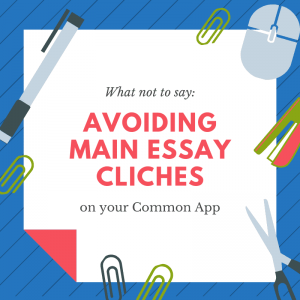
What NOT to write about
Not all topics are created equal
Knowing what topics to avoid is just as important as knowing what topics to pursue. College admissions officers read stacks of essays every day during the admissions process, and based on our experience, some subjects work better than others. We have included those topics below along with explanations for why these subjects don't work well. Please note that these rules are not hard and fast. Rather, they are meant to serve as guidance for you as you narrow down your topic.
List of accomplishments
Some students turn their Common App Essay into an extended resume. They list accomplishments and add insight and context, but together, they fail to tell a story. Avoid doing this for two reasons: First, it sounds braggy, which is probably not the quality you chose to highlight in Part 1. Second, it does little to answer the question "who are you." You are not the sum of your accomplishments.
Tragedies
Many students are tempted to talk about life-defining tragedies, like divorces or deaths. These experiences are absolutely formative and legitimate, but they don't make for great Common App Essays. Again, rather than answering "who are you", these topics tend to involve a lot of circumstantial explanation, which uses up valuable word space. But besides that, you want to leave your admissions officer nodding in interest when they put down your essay, not saying, "oof."
Consider that many colleges have an additional information section in which you can discuss any important factors you want the admissions officers to consider while they read your essay. If you have suffered a profound loss, especially one that influenced your grades or academic performance, it is a good idea to explain that in the optional essay.
"The most important thing/person in my life"
These subjects are a great way to demonstrate passion about the things you care about, but ultimately they tend to focus on something else, rather than you and your experience. You are the star of this story, not your role model.
Sports
Sports are not inherently bad to write about, but be extra mindful of cliche subjects. "My whole team was counting on me to score the winning goal, and when I did, I felt happy" is just as boring and irritating as "My whole team was counting on me to score the winning goal and when I didn't, I was sad." Themes of teamwork, discipline, and perseverance are all excellent, but consider how you can manipulate your sports story to be unique and avoid cliches.
"Do-good" experiences
So many students want to write about Habitat for Humanity , tutoring kids, caroling at nursing homes, or mission trips to developing parts of the country or the world. These essays often have the same conclusion: "I thought that I was going to (place) to (perform act of service), but in the end, I got way more than I gave." Unless these trips are part of an ongoing service effort that you can demonstrate over a period of time, admissions officers are skeptical of them. Many students use service trips to 'check a box' on their college resume, so mentioning it feels insincere. Moreover, it's hard to not make them sound either self-congratulatory or fake-humble.
However, this is not to say that a service trip can't serve as a setting for your story. If you went to build a school in Cambodia and want to tie your observations to your overall study of the socioeconomics of the Khmer Rouge, then of course it makes a good setting. Likewise, if you were inspired to action by something you saw at the tutoring center, then it's okay to talk about the birth of this inspiration.
"I'm so lucky"
While keeping a journal of gratitude is a great life practice, it's not great for the Common App Essay. It can come across as privileged to make a list of all the things that have gone well in your life, so the central premise of your essay should not be that you are a lucky person.
However, if you are a student who comes from a family of means, you might have struggled with the following question: Are my problems significant enough to write about? They seem very stupid compared to other people's problems. First of all, everyone has valid problems, you included. But second of all, it's good that you are thinking this way, because being self-aware is very important in your main essay, especially if you're going to talk about something like a rare opportunity, horseback riding, a fancy internship, or other similarly exclusive experience. In this case, it is good to acknowledge the "I'm so lucky" aspect of your story, but be brief. Demonstrate some self-awareness and self-discovery , then proceed with your story.
Humor
Humor is awesome and so are funny people, but not everyone's sense of humor is the same, so telling a funny story is a risk. If the admissions officer doesn't think it's funny, then your ship has sunk. The Common App Essay is a place for you to demonstrate sophistication and maturity as a student, so building a story around humor may undermine these aspects of your personality. You don't want the officer questioning whether you are mature enough to handle college. However, one or two small quips can be a great way to show your personality. Just make sure that your jokes can't be perceived as offensive in any way.
Sensitive topics
For your Common App Essay, " dinner conversation " rules apply. It's risky to talk about polarizing topics like politics or religion, and don't say anything that would make your great grandmother blush. Something like political activism might be a great thing to talk about, but avoid turning your main essay into your manifesto. While the admissions officers are meant to be impartial, they are also human beings, and you'd hate for a disagreement of beliefs to be the reason you are rejected.
Illegal experiences
The time you were arrested or almost arrested is a bad thing to write about. Similarly, the time you tried or didn't try drugs or alcohol is a bad thing to write about. Likewise, the time you stole something (even though you felt super bad about it and came clean later) is a bad thing to write about. are you sensing the pattern? Don't do it!
The Un-Essay
These days, students are always trying to set themselves apart. They think that the best way to stand out is to take a non-traditional approach, like turning their essay into a screenplay, an interview, or a piece of code. We discourage these approaches. First, you are far from the first to try such things, so it will not be perceived as unique. Second, it's very difficult to do well. Third, you are often sacrificing quality of content for novelty of form. There are times to play it safe in life– your main essay is one of them.
An essay about how essays are stupid
Yes, we know that it's hard to condense your whole being into 650-words, and it's even harder to use these words to argue for why you should be allowed to go to college. This is implicit in the process and you do not need to point out the faults in the admissions process. To do so makes you seem angsty and immature, not wise and aloof as you hope it does.
Remember that these rules are not hard and fast, and there will always be circumstances that call for you to write about one of the things on the no-no list. These examples are here to help give you direction, not crush your dreams. If you are unsure about the story you've chosen, talk about it with your family, teachers, mentors, or friends. They know you well and might have great ideas about how to show off your best self.
Before we start planning our draft, there is one last aspect to consider in your essay…
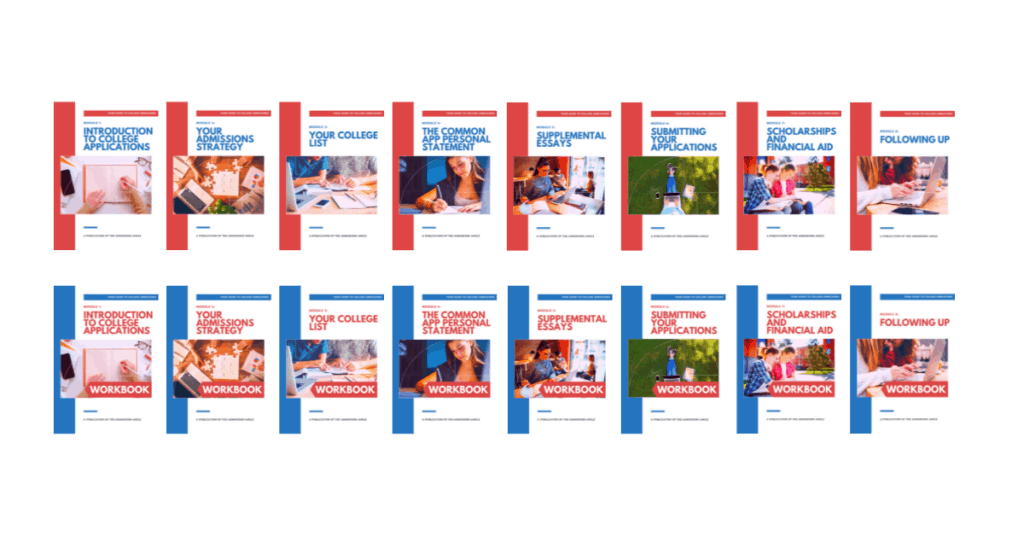
The College Essay Lab
Get access to all 8 modules, each with its own review manual and actionable workbook for $799
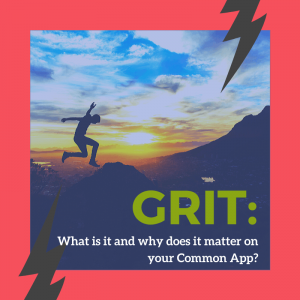
Demonstrating grit
What is grit?
By now, you have most likely encountered Angela Duckworth's revolutionary TEDTalk from back in 2013, called Grit: The power of passion and perseverance (note: If you haven't watched it, we highly recommend it). In her talk, Duckworth describes how metrics like IQ and school performance are not good indicators of future success. Rather, she discovered that independently of how academically clever or how financially well off a student is, grit is the most powerful indicator of how a student will perform . Since then, colleges, who were long bound by the fallibility of test scores and GPAs, have also begun to explore the power of grit and factor it into their decision making process.
So first of all, what is grit? Grit is a non-cognitive personality trait based on an individual's perseverance of effort combined with the passion for a particular long-term goal or end state. We can break this down into two parts: passion and perseverance.
Demonstrating passion
Passion is a word that has always personally irritated me because it is used so noncommittally. I hear people say "I'm passionate about dogs/cooking/working out/you name it" all the time, but if we are digging to the core essence of what passion is all about, you should only have space for one or two true, passionate interests. This is what admissions officers want to see, and it is what you should strive to offer them in your main essay.
Now, a couple of notes: First, it is helpful if your passion serves others in a way. For example, if you are really into entrepreneurship, then you should consider how your innovations will help the world. If you are passionate about ballet, then you should consider how artistic expression is good for the world in general. Second, it is helpful if your passion serves a larger goal that is somehow attainable through the path you are choosing. If you are passionate about cooking but applying for a mathematics major, then take care to connect the mathematical aspects of cooking to the theme of your essay. If you are passionate about working with kids but you are applying for a psychology major, then demonstrate how the two go hand in hand.
Demonstrating perseverance
The key here is longevity ; passion should not be viewed as a fleeting or newfound interest. The only way to demonstrate grit is to show that you have been chipping away at some larger goal for an extended period of time. In doing so, you will have demonstrated perseverance, or "stick-to-it-ness". Perseverance is an incredibly valuable quality in a candidate because it gives admissions officers the peace of mind that you will see your attendance through to graduation and go on to build a meaningful career in something that you care about. If you can show that you will provide four years of solid attendance, good grades, participation, and tuition, then you are a dream candidate.
As you can see, those who chose an Admissions Angle early in their high school careers are at a distinct advantage when it comes to demonstrating perseverance, longevity, and grit. But any interest that has held your attention for at least two years should be good enough to mention.
Showing that you are gritty
As you have probably figured out, the secret to demonstrating grit is showing that you have been passionate about something for a while and that you have worked hard to explore and grow this passion. However, this does not need to be the main essence of your essay. It is okay if you only bring it up tangentially.
For example: If your essay is about how you spent a summer building a canoe with your Grandfather, this in and of itself demonstrates the grit to see a large project to completion. But you can apply this experience further by showing that the lessons you learned (like measure twice, cut once) were helpful when you went on to found the Blockchain Club at your school. Just by mentioning your Admissions Angle (in this case, blockchain), you will reinforce your interests in the mind of the admissions officer. Then, you can drop similar references in your supplemental essays and, of course, your resume.
Concluding thoughts
Through what to talk about, what not to talk about, and demonstrating grit, we have offered you a lot of criteria for what we believe forms the perfect essay. However, you may be struggling to keep track at this point, or you might feel that the window is too narrow to achieve.
Remember that the Common App Essay is meant to require a great deal of thought. It is meant to require a great deal of effort. The process of writing the Common App Essay should take a long time, if you are following a good essay timeline .
Our number one advice for deciding what to write about in the Common App Essay is to talk to people who know you well. Ask your mom or dad! Talk to your teachers, coaches, mentors, or… dare I say… siblings! They have unique insight on you that you don't have on yourself. In the meantime, collect essay samples, engage in college research , and enjoy your senior year.

Need Help with College Applications?
Join us in The College Application Lab!
- Online Course that covers everything you need to conquer the FULL college application process
- Major Focus on Personal Statement Essay and Supplemental Essay Archetypes
- Full Walkthroughs for Filling out the Common App, Coalition App, and UC app
What To Write For Common App Essay
Source: https://www.theadmissionsangle.com/2020/06/16/common-app-essay/#:~:text=Common%20App%20Essay%20prompts&text=The%20lessons%20we%20take%20from,challenged%20a%20belief%20or%20idea.
Posted by: thackerrensell.blogspot.com

0 Response to "What To Write For Common App Essay"
Post a Comment